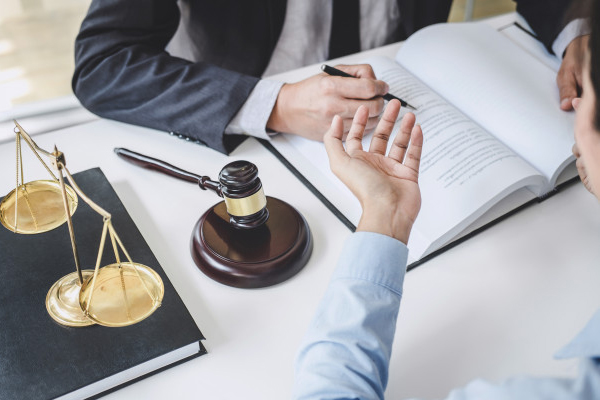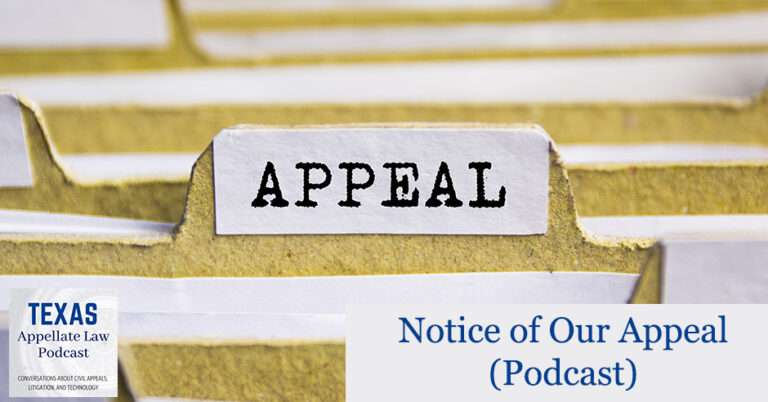What is appellate law? For practitioners of this craft, it varies from day to day and week to week based on the cases they work on in different courts. In their inaugural episode—recorded in the Texas Supreme Court courtroom—Todd Smith and Jody Sanders introduce themselves and share their respective journeys toward becoming appellate practitioners. They also share their vision for the podcast, which is to provide useful information for lawyers who handle appeals and those who don’t, but who want to learn more, through conversations with each other and guest interviews involving all aspects of appellate practice.
—
We’re glad to have you with us. This is our first episode. To get things started, we would spend a little time talking about ourselves, what our backgrounds are, and what this show is all about, perhaps in maybe a Q&A form with each other. Jody, tell our audience where you come from, where you’re practicing, and what has led you to be interested in practicing Texas appellate law.
I am a partner at Kelly Hart & Hallman in Fort Worth in both the appellate and the litigation sections. I’ve been there almost 15 years. I started right out of law school. I grew up in a little town called Orange, Texas, which is in the southeast corner of the state. I went to college at TCU in Fort Worth. I went to law school at the University of Houston. I moved back to Fort Worth right after. I wanted to be back in Fort Worth and I’ve been there ever since. Starting out of law school, I didn’t think I wanted to do appellate work at all. I only had the exposure of doing briefing and legal writing and didn’t like it. It was on an expert issue that was boring and so I thought, “This is not something that’s going to be anything for me.” Then I got into practice and worked on a couple of briefs and it was okay. I didn’t know much because there wasn’t a lot of appellate work there. It was mostly litigation, and they handle their own appeals.
About my third year of practice, David Keltner joined our firm, who’s a phenomenal appellate lawyer. I started working with him and realized what appellate practice really meant and realized that I loved it. As David always says, our job as appellate lawyers is to talk to judges. I found that that’s what I enjoyed, the intellectual part of it, the research, the writing. Spending way too much time sitting, thinking about the law at my desk every day, which is hard to put in your billing and explain what you’re talking about when you do that. I realized I loved it and it’s been that way ever since. There’s something exciting to me and probably only to me and fellow legal nerds like me about getting a new case, digging into the record, trying to figure out what the issues are, what’s preserved, and how best to present that to get three judges who don’t know anything about your case to say the trial court did something wrong.
You might say that your path to becoming an appellate practitioner was nontraditional.
That’s right. I didn’t do the traditional clerkship route and any of that stuff. I fell into it by luck and it ended up being a perfect fit.
I took a more traditional path to it. I also happened to be a TCU Horned Frog undergrad. I’ve got a few years on you though, Jody. After I came out of TCU, I kicked around a little bit and then went to law school down at St. Mary’s. I did reasonably well in law school and then found myself on the Law Journal. In my third year, I found myself Editor-In-Chief of the Law Journal. I was doing a whole lot of editing other people’s work and in addition to my own writing and was doing some moot court stuff. I started getting the bug a little bit even in law school. I came out of law school and then clerked at the Texas Supreme Court here for Raul Gonzalez for two years in the mid-‘90s. From there, the world opened up to me. I wasn’t sure exactly where I was headed. I wound up taking a job with Fulbright & Jaworski in Dallas and spent the next nine years at that firm, the last three of which were here in Austin.
While I was there, I did both litigation and appellate work. Where my heart was in the appellate work. I figured out while I was clerking, I think, that I had a reasonably good skillset to do that kind of work. I had seen the work product that the lawyers of Texas were putting out and presenting to the Texas Supreme Court, the highest court in the state. I had seen what they were doing in terms of the quality of the oral argument, which I’ll say I think has improved a lot in 2o-something years I’ve been practicing.
I figured, “If those guys and gals can do it, I can do it.” I refused not to be allowed to do it. I developed my practice that way. After all those years at Fulbright, I decided to open my own practice. For the last 14 years, I’ve been a variation of a sole practitioner, having as many as three other lawyers with me and my firm, and these days I’m back to being a solo and things are going well. I love the work. What I’m curious about is you mentioned as far as thinking about the law and presenting it to a three-judge panel. I’m doing a lot of trial court work, a lot of litigation support, jury charges, case theory, strategy, summary judgment motions, etc. Is that a significant component of your practice?

It is. When I talk to people who ask me, “What is an appellate practice? What do you do?” The answer is a whole lot of things. It varies month-to-month and week-to-week. Some months all I’m doing is sitting, researching, writing briefs, and thinking about that stuff. Other months you get a call, “Next week we’re headed to trial. Even though you don’t know anything about the case, we’d like you to come to sit alongside us and help us preserve error, help us think about how to do the charge, make sure all our objections are made properly.” And so it really does vary. There may be a month where I’m gone for two weeks, all of a sudden in some far-flung locale to help out a trial team that called us. It all comes back to the same thing that I mentioned, talking to judges. We’re there to keep up on the law and tell the judge why the law is what it is and how it applies in this particular case and thinking about, what do we want the record to look like? If we’re going to win or we’re going to lose, what things do we think need to be in the record to most effectively present our appeal? A lot of that, I even call it “appellate prevention work.” Because if we do it right, then the other side is going to have a much harder time appealing some of the things that went on and we’re going to have an easier time. I think I do a lot of that. It sounds like you do too.
I think it’s at least half of my practice which is interesting. It goes in cycles much like you suggest. I’ll go through long stretches where I haven’t been in front of a court of appeals arguing. I’m usually filing briefs with some regularity. These things ebb and flow over time. I’m frequently primarily in the courts of appeals. And because I live in Austin, that’s just where the bulk of my work comes from, primarily in the Third Court of Appeals. Other times it seems like all those cases that have been percolating in the courts of appeals all go up to the Supreme Court around the same time. I will wind up doing stretches where I’m doing more work in the Supreme Court than I am in the courts of appeals. But it’s a pretty constant thing for me to have cases going in the trial court. I love that phrase, I don’t know if you or Keltner coined that, but appellate prevention work is descriptive of what a lot of us do.
I’m grateful to have the work that isn’t just me sitting behind the computer writing briefs. I love that work. One little tale from my days at the big firm. It’s the late ‘90s. The market was still good. And as young lawyers, we were going all over the country and litigating these big national dockets, and I was trying to build this appellate practice. One thing I figured out quickly is my eight hours of billable time working on a brief was a lot harder to get than eight hours of billable time working on a litigation file. For me, I’ve got to be doing the mental gymnastics it takes to figure this stuff out, while my counterpart, who started at the firm at the same time I did, was busy reading Sports Illustrated on an airplane somewhere. His billable hour doing that was as good as my billable hour doing this. That’s one thing that makes me grateful for the stuff that gets me out from behind the computer because it is very mentally taxing work.
I thought for a minute, one thing that we would do is tell people how we got here because, as far as I know, this the first appellate law-related show in Texas. Justice Wise from Houston has a podcast, but his is more focused on Texas history. I haven’t been able to find anyone doing a podcast focused on Texas appellate law and I don’t consider myself to be a trailblazer. I’ve been thinking about doing this for several years, but you and I connected and started talking about it. We had a little prodding by Blake Hawthorne, who everyone knows is the Clerk of the Supreme Court of Texas. The next thing I know is here we are sitting together at a table doing it face to face.
Like all good things, it started out with a joke on Twitter, where I mentioned the idea of doing an appellate podcast. I’d be glad to invite all my #AppellateTwitter friends, which by the way, if you’re on Twitter and you like appellate law, there’s the #AppellateTwitter hashtag you should follow. It’s got all kinds of great practitioners from all over the U.S. and all over the world. They have all kinds of great stories, articles of interest, tips, and tricks. There’s fantastic content out there. I made a joke about that and Todd responded and said, “Are you actually interested in doing a podcast?” The answer is, “I’m a nerdy introvert in my late 30s, so of course, I’m interested in doing a podcast.”
I just didn’t know what anyone would be willing to hear me talk about for 30 minutes. Todd and I got to talking and we realized that we both had an interest, but both thought that doing it by ourselves was a little too overwhelming. I think each brings different strengths. Todd already had all the technology in hand, he knew how to work it, and that is something I had not explored. I’m happy to talk into a microphone about nonsense all day long. It worked out. Like he said, there was some prodding by Blake Hawthorne. If you hear an echo on the recording, it’s because we’re actually sitting at counsel table at the Texas Supreme Court. Blake was extremely gracious and said he would have us here, host us for our first couple of episodes, he’d be a guest, and he’d get a justice to come to join us. We certainly were not about to pass up that offer. So, right now we’re sitting in the courtroom talking to each other in an empty courtroom with all the pictures of the justices looking down on an empty bench in front of us, which is nice because nobody’s going to fire a question at us that we’re not prepared for.
It’s funny because even though you and I both went to the same undergrad institution, I knew of you, I’d heard your name and I think I read some of your CLE stuff. In fact, I pulled up the findings of fact and conclusions of law paper with Justice Keltner. I was in a situation I needed to do a little more digging than the knowledge level I had off the top of my head. But this is something I’ve thought about doing for years. It seemed like there was a need in the space for it. If it’s done right, we can do it in such a way where we’re not going to bore everybody to tears.

I think our objective is to try to keep the episodes reasonably short and talk primarily about appellate related issues. We decided to do this inaugural episode with just the two of us. But as you suggested, Jody, we’re going to have some people come on and we’re going to ask them some questions. As a fellow introvert, I don’t consider myself a great interviewer, but if you put three people together, surely we can have a conversation that generates something worthwhile.
I like to think about it in terms of it being a conversation. Some of the legal-related podcasts that I listened to are not super technical. It’s more about finding like-minded people who share your interests and speak the same language as you. We can do some fun things with this that not only geek out with our appellate brothers and sisters, but I hope appeal to some of the trial bar as well to provide them some guidance. I’ve always considered that part of my job, to educate the trial lawyers so that we can have that appellate prevention practice.
I have the same vision. People that want to geek out to appellate stuff, we’re here for you. Let us know, if you have a great topic, if you think you’d make a good guest, we want to learn from people from all backgrounds. We want to be very intentional about amplifying voices that maybe don’t always have that. Contact us. We’ll share our contact information. We’d love to learn from you and maybe have you on as a guest. We want to make it something that’s interesting to people who aren’t just appellate lawyers.
If you look at the advanced appellate course, there are about 100 in the state of Texas of 30 million people, so that’s not going to get us a lot of listeners. Hopefully lawyers who don’t do appeals, even lawyers who don’t do litigation, will be interested, or people that just want to learn a little bit more about how the appellate process works. We had primary elections and even I, as an appellate lawyer, don’t know some of the names on some of the ballots for the appellate courts and trial courts. I did my research, but everybody texted me on primary day, “Who are these judges? What do they do? What’s this all about?” We can also educate the public a little bit about that process as well and shed some light on what they do.
That’s where I thought we would go for this episode. Do you have anything else?
Look for us. We’re going to be on social media. We haven’t developed our hashtags or anything like that. I’ll go ahead and put my contact information out there. If you want to contact us, my email is Jody.Sanders@KellyHart.com. If you have thoughts for the show, feedback, suggestions, if you want to be a guest and you think you have some great ideas, reach out to me. I’d love to hear from you.
My email address is Todd@AppealsPlus.com. Since we mentioned Twitter, I’ll throw out my Twitter handle. It’s @DToddSmith. I totally agree with what Jody said. We are looking for input and feedback, and we would love to grow a tribe to come out of this. Social media provides so many ways for people to reach out and connect. I think that this show can do the same thing. We look forward to connecting with the audience on those other media.
I’ll throw my Twitter out too. It’s @JodySSanders.
That’s it for this episode. We look forward to seeing you next time.
Important Links:
- Kelly Hart & Hallman
- David Keltner
- Podcast – Wise About Texas by Justice Ken Wise
- Blake Hawthorne – Twitter
- Jody.Sanders@KellyHart.com
- Todd@AppealsPlus.com
- @DToddSmith – Twitter
- @JodySSanders – Twitter
Love the show? Subscribe, rate, review, and share!
Join the Texas Appellate Law Podcast Community today:
